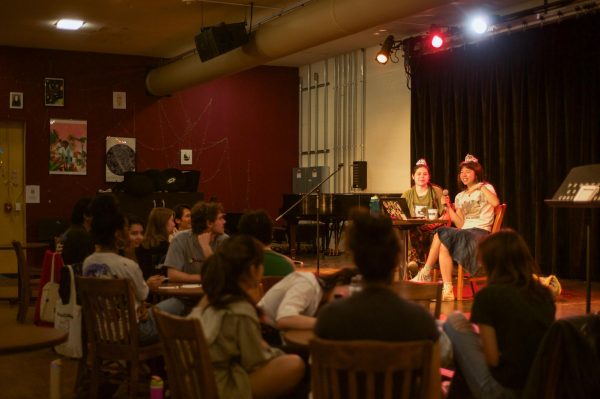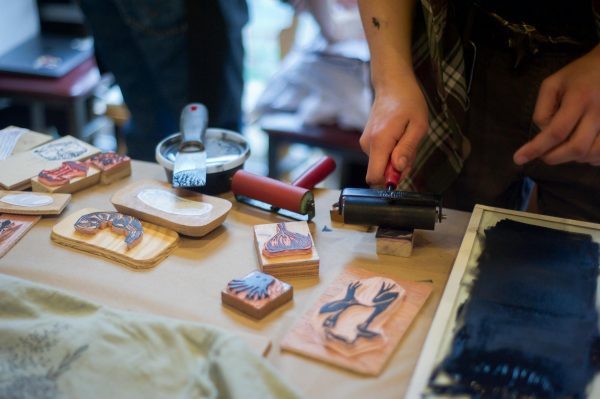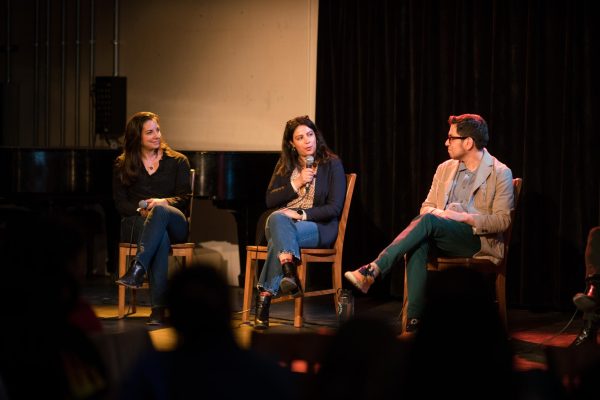Rabbi Shais Taub Delivers Spiritual Take on Stress, Self-Care
In this particularly stressful time of year, various groups on campus are organizing events oriented around self-care, some of which include inviting visiting speakers to bring their perspectives to the topic. On Wednesday, Pittsburgh-based Rabbi Shais Taub was invited to Oberlin by Chabad to offer insights on creating a healthy environment within one’s own mind, and ignoring that which distracts you from your purpose.
Rabbi Taub, a scholar, teacher, and author who NPR has referred to as “an expert in Jewish mysticism and the Twelve Steps,” provides spiritual guidance to people facing stressful situations in their lives. After studying at the Central Lubavitch Yeshiva in Crown Heights, Brooklyn, he combined his religious background with his interest in mental health and wrote the book God of Our Understanding: Jewish Spirituality and Recovery from Addiction. He was also recently selected to deliver a keynote address on “G-d and Recovery” at the First Annual Conference on the Evolution of Addiction Treatment.
“Being in the field as a rabbi, counseling people, and through various different … [types of] divine providence, I had different experiences where I was able to become involved in certain communities — for example, the recovery community,” Rabbi Taub said. “Jewish people … are involved in recovery from addiction, I was involved in being a spiritual counselor to such people.”
At the talk on Wednesday afternoon, Rabbi Taub told the story of a man who once sought the help of a teacher so that he could learn to control his own thoughts. When the man knocked on the teacher’s door several times, there was no answer, even though the man could hear people inside, so the man went to the synagogue and spent the night on a bench. The next day, he came across the teacher and asked for his help. The teacher readily agreed and invited the man to his home for a meal. After the meal, the man asked the teacher why he had been so poorly treated the night before, and why the teacher hadn’t taught him anything about controlling his thoughts yet, as that was the entire purpose of the man’s visit. The teacher responded that he had already taught the man this lesson on the first day. He said, “Just because someone is knocking doesn’t mean I have to open the door.”
Expanding on the story, Rabbi Taub illustrated the difference between thinking of something and thinking about something. He likened thinking of something as the knocking on the door, something which cannot be controlled or done away with. Rabbi Taub explained that it is human nature for random thoughts to pop up in one’s mind, and these thoughts cannot be prevented from occurring — you can’t stop someone from knocking on your door. The choice we have, Rabbi Taub said, is whether we think about these random thoughts that knock on the doors of our mind. If we allow thoughts to enter and dominate our minds, they can cause us pain, suffering, anxiety, and worry. If we recognize these thoughts “knocking” but decline to let them in, we are in control.
Rabbi Taub conducted several small social experiments to prove his point. He asked every audience member to spend some time doing multiplication tables in their minds for a few minutes. After some time passed, he asked whether they had all done the multiplication tables, and the audience members nodded in affirmation. Rabbi Taub used this exercise to demonstrate that people are comfortable with considering mental undertaking as an activity, something that is done voluntarily.
While this idea was mostly appreciated, audience members found that his methods could not be applied to every situation.
“When he was talking about the knocking on the door and the bad thoughts, I was kind of thinking about sexuality and homosexuality,” said College senior Rebecca “Prim” Primoff. “If … you’re closeted and are just realising you’re gay, his methods would have you ignore your gayness. So there certainly were aspects of the talk that I found would be an exception to his theory.”
An example of mental choice that Rabbi Taub provided was what he called the “trauma museum.” For some people, their past or future worries can trigger behavior that perpetuate a cycle of trauma. Rabbi Taub said that to break the cycle of trauma, one needs to avoid the “free tickets to the trauma museum.” While old traumas are bound to come knocking and may shout discouraging things across the door of your mind, Rabbi Taub argues that you must not allow yourself to think about — or of — these things, and focus instead on the present.
“Overall, it was helpful. I actually really liked his museum example when he was like, ‘free tickets to the trauma museum’,” Primoff said. “It’s really easy to let yourself into the trauma museum, I really related to that.”
Very few people attended this talk on self-care, and the religious aspect of it could have been one of the central causes for students to not identify this talk as their space, despite the stress of finals week. Rabbi Taub addressed this potential issue.
“A liberal arts education is about being open-minded and well-rounded,” he said. “To be truly open-minded and well-rounded, avail yourself of wisdom that may come from faith traditions. Even if you don’t see yourself as a believing person, at least expose yourself to it and see if it has something to offer you, or at the very least [see] if it gets you thinking in a very different way.”
Rabbi Taub emphasized that he sees himself primarily as a teacher — he is not a therapist — and that he values the roles of psychologists, counselors, and therapists.
“My role is to offer language,” he said. “I try to speak in regular everyday English, and I’m trying to describe spiritual phenomenon in everyday English so if I can give someone a language that they can use or apply to their lives or apply in a therapeutic context then that’s great. I’m just there to provide the words, provide the ideas. And everybody can figure out how they want to apply it.”
His inclusive nature was appreciated by audience members, as he encouraged listeners to pick and choose the aspects of his talk that they liked, and discard the rest at their own discretion.
“I think the lecture did a great job of allowing Oberlin students to take a break from this stressful time of year and learn about coping mechanisms in a warm and welcoming environment.” College senior Anabel Epstein wrote in an email to the Review. “It is great to find spaces like that at Oberlin.”








